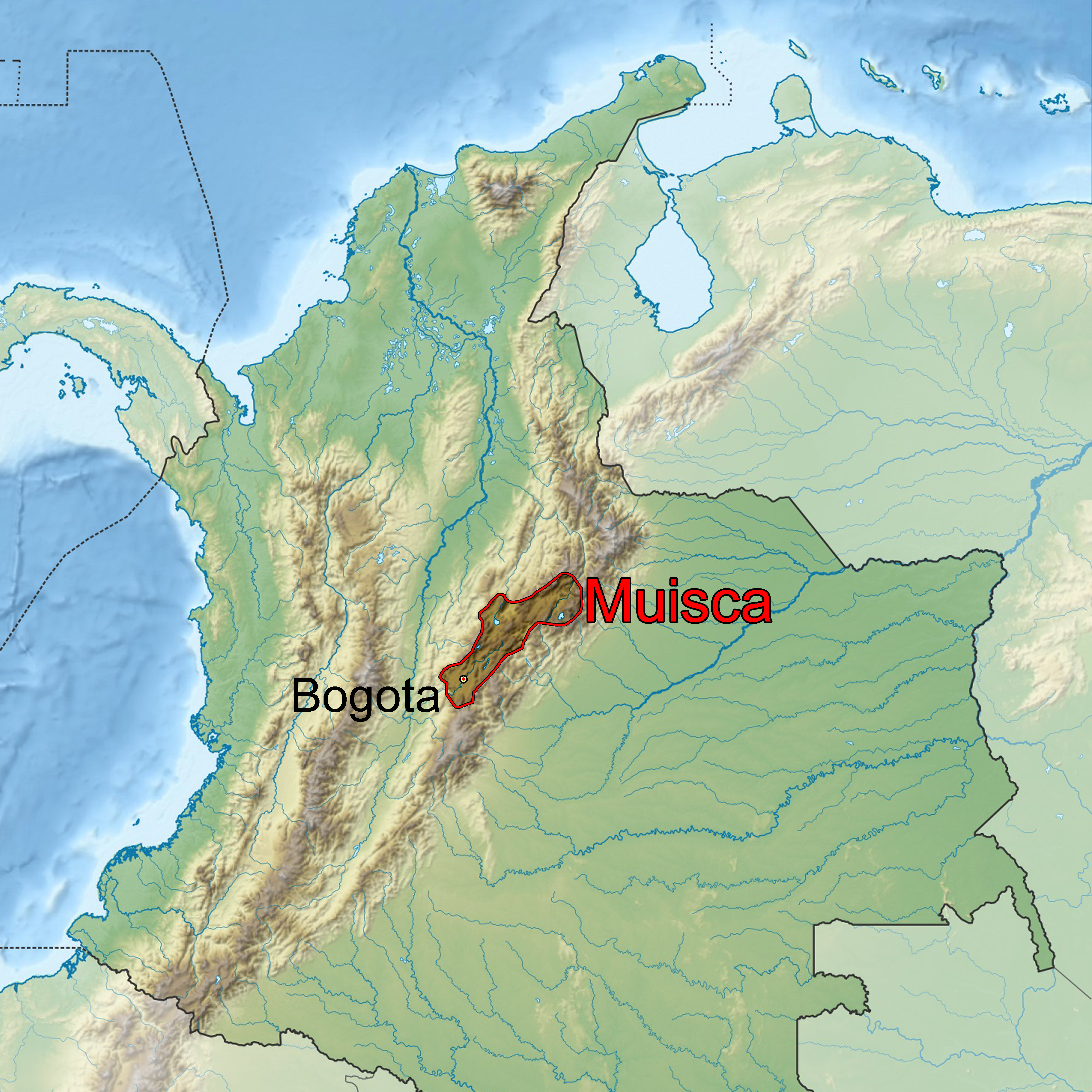|
Cucunubá
Cucunubá is a municipality and town of Colombia in the Ubaté Province, part of the department of Cundinamarca. It borders with the municipalities of Ubaté, Lenguazaque, Suesca, Chocontá, Tausa and Sutatausa. Geography The urban centre of the municipality is located in the Ubaté Valley at an altitude of , while other parts stretch over the mountainous sectors of the Eastern Ranges of the Colombian Andes. The urban centre is at a distance of from the capital Bogotá. Etymology The name Cucunubá comes from Chibcha and means "Similarity to a face".Etymology Cucunubá - El Tiempo History Cucunubá in the times before the |
Muisca Confederation
The Muisca Confederation was a loose confederation of different Muisca rulers (''zaques'', ''zipas'', ''iraca'', and ''tundama'') in the central Andes, Andean highlands of what is today Colombia before the Spanish conquest of the Americas, Spanish conquest of northern South America. The area, presently called Altiplano Cundiboyacense, comprised the current departments of Colombia, departments of Boyacá Department, Boyacá, Cundinamarca Department, Cundinamarca and minor parts of Santander Department, Santander. According to some List of Muisca scholars, Muisca scholars the Muisca Confederation was one of the best-organized confederations of tribes on the South American continent. Other Historian, historians and anthropologists, however, such as Jorge Gamboa Mendoza, attribute the present-day knowledge about the confederation and its organization more to a reflection by Spanish chroniclers who predominantly wrote about it a century or more after the Muisca were conquered and propo ... [...More Info...] [...Related Items...] OR: [Wikipedia] [Google] [Baidu] |
Spanish Conquest Of The Muisca
The Spanish conquest of the Muisca took place from 1537 to 1540. The Muisca people, Muisca were the inhabitants of the central Andes, Andean highlands of Colombia before the arrival of the Spanish conquistadors. They were organised in a loose Muisca Confederation, confederation of different Muisca rulers, rulers; the ''zipa, psihipqua'' of Bacatá, Muyquytá, with his headquarters in Funza, the ''zaque, hoa'' of Tunja, Hunza, the ''iraca'' of the sacred City of the Sun Sogamoso, Sugamuxi, the Tundama of Duitama, Tundama, and several other independent ''caciques''. The most important rulers at the time of the conquest were ''psihipqua'' Tisquesusa, ''hoa'' Quemuenchatocha, Eucaneme, ''iraca'' Sugamuxi and Tundama in the northernmost portion of their territories. The Muisca were organised in small communities of circular enclosures (''ca'' in their language Chibcha language, Muysccubbun; literally "language of the people"), with a central square where the ''Muisca architecture, boh ... [...More Info...] [...Related Items...] OR: [Wikipedia] [Google] [Baidu] |
Ubaté Province
Ubaté Province is one of the 15 provinces in the Cundinamarca Department, Colombia Colombia, officially the Republic of Colombia, is a country primarily located in South America with Insular region of Colombia, insular regions in North America. The Colombian mainland is bordered by the Caribbean Sea to the north, Venezuel .... Etymology The name Ubaté comes from the native name "Ebate" meaning "Bloodied land" or "Sower of the mouth". Subdivision The Ubaté Province is subdivided into 10 municipalities:Orden en las provincias de Cundinamarca - El Tiempo References [...More Info...] [...Related Items...] OR: [Wikipedia] [Google] [Baidu] |
Muisca People
The Muisca (also called the Chibcha) are indigenous peoples in Colombia and were a Pre-Columbian culture of the Altiplano Cundiboyacense that formed the Muisca Confederation before the Spanish colonization of the Americas. The Muisca speak Muysccubun, a language of the Chibchan language family, also called ''Muysca'' and ''Mosca''. The first known contact with Europeans in the region was in 1537 during the Spanish conquest of New Granada. In New Spain, Spanish clerics and civil officials had a major impact on the Muisca, attempting to Christianize and incorporate them into the Spanish Empire as subjects. Postconquest Muisca culture underwent significant changes due to the establishment of the New Kingdom of Granada. Sources for the Muisca are far less abundant than for the Aztec Empire of Mesoamerica or the Inca Empire and their incorporation to the Spanish Empire during the colonial era. In the New Kingdom of Granada and into the colonial era, the Muisca became " ... [...More Info...] [...Related Items...] OR: [Wikipedia] [Google] [Baidu] |
Sutatausa
Sutatausa () is a municipality and town of Colombia in the Ubaté Province, part of the department of Cundinamarca. The municipality is located on the Altiplano Cundiboyacense at a distance of from the capital Bogotá and borders Ubaté in the north, Tausa in the south, Cucunubá in the east and Carmen de Carupa and Tausa in the west.Official website Sutatausa Etymology The name Sutatausa comes from and means "small tribute".History The area of Sutatause before the[...More Info...] [...Related Items...] OR: [Wikipedia] [Google] [Baidu] |
Tausa
Tausa () is a municipality and town of Colombia in the Ubaté Province, part of the department of Cundinamarca. Tausa is and was an important town on the Altiplano Cundiboyacense due to its salt mine. It was the third most prolific salt deposit for the original inhabitants of the area; the Muisca. Tausa's urban centre is located at an elevation of (other parts of the municipality reach elevations of ) and a distance of from the capital Bogotá. The municipality borders San Cayetano, Carmen de Carupa and Sutatausa in the north, Pacho in the west, Sutatausa, Cucunubá and Suesca in the east and in the south with Nemocón and Cogua. Etymology The name Tausa comes from Chibcha and means "tribute".Espejo Olaya, 1999, p.1124 History Tausa was inhabited since the Herrera Period. The town was an important mining location of halite for the Muisca. The ''zipa'' of Bacatá ruled over Tausa. The mining activities can be seen in the seal of the village; the pick and spade. Modern ... [...More Info...] [...Related Items...] OR: [Wikipedia] [Google] [Baidu] |


